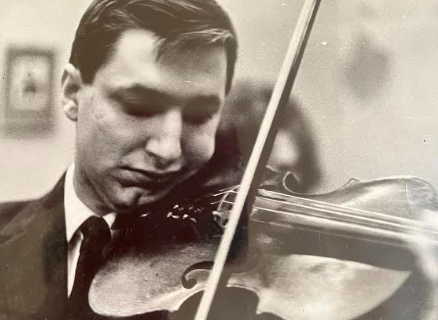Interview with Michael "Misha" Kisin: Bridging Musical Generations, 60 Years as a Violinist
- Sarah Kisin

- Jan 25, 2025
- 6 min read
Updated: Feb 19
Misha is my grandfather and has been a musician all his life. He was part of the Lithuanian State and Melbourne Symphony Orchestras, as well as performing as concertmaster with the Sapporo Symphony Orchestra. You can view our performance of Mozart Sonata for Violin and Piano in G major here.
Q: How did you get started playing the violin?
A: I was born in Latvia in the former country of the soviet union in a Jewish family and a lot of Jewish mothers wanted their children to do music. My mother wanted me to play the violin. I entered a music school and I started my musical education in the music school. Then from school, I went to the music college, and from there, I went to the Academy of Music.
Q: What inspired you to pursue music?
A: To be honest with you, nothing inspired me to pursue music because I was five years old. You wouldn't call it inspired because it was very difficult for me to practice and study violin while all my friends were playing soccer in the backyard. You wouldn't find anybody who would be willing to sacrifice their free time to study a musical instrument. Of course when time progresses and you become older, then you acquire a taste for music. When I was 10 or 11 years old, I started getting interested by myself in music making.

Q: What were some highlights or accomplishments of your musical journey?
A: My highest moment in musical education was my exams when I was in the final year of the conservatory and I played a recital. After that, I played in the Lithuanian State Orchestra. When we immigrated to Australia I got a job with the Melbourne Symphony Orchestra and then I became the principal of the first violin section. Then for two and a half years, I was the concertmaster of the Sapporo Symphony Orchestra.
Q: What were the challenges you had to overcome on your musical journey?
A: The biggest challenge was before we came to Australia we were in transit in Italy I had to do a lot of practice because I knew that eventually, we would come to Australia and I would have to get a job. When we came here I played an audition and I got a job.
Q: How has music positively or negatively impacted you?
A: I think that studying an instrument when you get to the professional level teaches you how to cope with difficulties in life. In every performance, there are certain challenges because you get nervous and you have to overcome your nerves and perform to the best of your abilities.
Q: Has your emotional connection to music changed over the years?
A: I went through a period of liking classical music more than anything else. When I was older and started playing in the orchestra my preference was late romantic music like Richard Strauss and Gustav Mahler. In terms of emotional connection, you have an emotional connection when you play solo and sometimes when you play as part of the tutti. It's two completely different emotional connections. Sometimes with music you like you can develop an emotional connection playing in the tutti.
Q: Do you have any specific connections to specific musical works?
A: Music by Richard Strauss and Gustav Mahler because I feel an emotional connection to this music. It electrifies me and sometimes the music is so beautiful that you get tears in your eyes. Some people for example prefer Mozart to Mahler so it's different for each person.
Q: Do you feel different emotions when practicing versus performing?
A: Of course! When you practice it's like cleaning a house. When you perform your house has to be clean like you are expecting visitors so that they will be impressed. When you practice you shouldn't really show any emotion because it's like cleaning your house, you have to address problems or difficult passages but when you get to a lesson it’s different. You have three stages, when you practice at home, when you play for your teacher, and when you play for a big audience. Since you have performed all over the world, what has been your experience with how different audiences have responded emotionally to your performances and to specific works? Audiences usually react to the music you are playing. So you can get a very cold reception when you play some of the contemporary stuff, but you can get a very warm reception to late romantic works. From my experience, the audience in Japan is less receptive. However, when I was performing Beethoven's Triple Concerto in Japan with cello and piano in the finale my E string broke so I quickly exchanged the instrument with the concertmaster and I finished the concerto on the new violin. That impressed the audience enormously! I also think European audiences are much more emotional than audiences in Australia, since the majority of the composers I play come from Europe.
Q: Has playing in ensembles and orchestras brought you closer to people?
A: I think it comes to professionalism. Sometimes you have to work with people and you don't like your playing, but you’re asked to do it. I had a friend of mine who was a cellist and I had a very good relationship with him and we still maintain our friendship through email, and I enjoyed working with him!



